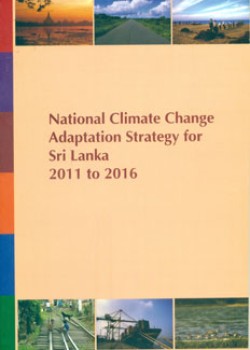
National Climate Change Adaptation Strategy for Sri Lanka 2011 to 2016
Publisher: Ministry of Environment
Place of Publish: Sri Lanka
Year: 2010
Page Numbers: 56
Acc. No: 3767
Class No: 338.9 NAT-SL
Category: Books & Reports
Subjects: Development
Type of Resource: Monograph
Languages: English
Meeting the nutritional needs of the country is prioritized through government policy. Recognizing the importance of agriculture and livestock for national development, the government developmental policies envisage an agricultural renaissance, with special attention on the paddy farmer. The aim is to achieve self-sufficiency in food crops and milk for the people, and also to generate agricultural crops and livestock for the export market. Already 150,000acres of abandoned paddy fields earmarked to be filled, have been readied for cultivation, and a further 150,000acres are targeted for re-cultivation. Projections at the global level indicate strongly that climate change could severely affect agricultural production, with cereal production in developing countries being affected the most. Therefore, despite Sri Lanka now being self-sufficient in rice—the staple food of the people—ensuring national food security for all and at all times, is a key need in the face of projected climate change. The paper also highlights the overall fishery sector where environmental aspects of marine, coastal fishery and related ecosystems are discussed, including inland food fishery and aquaculture.



